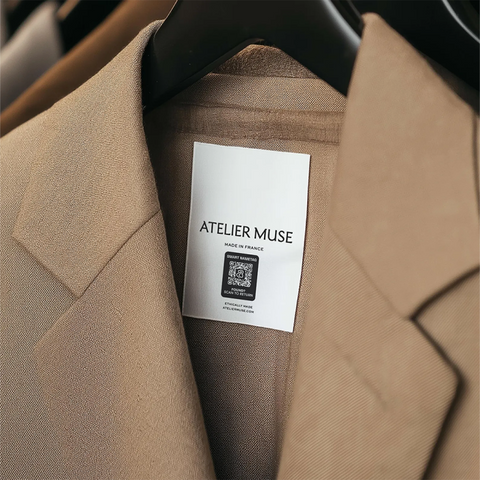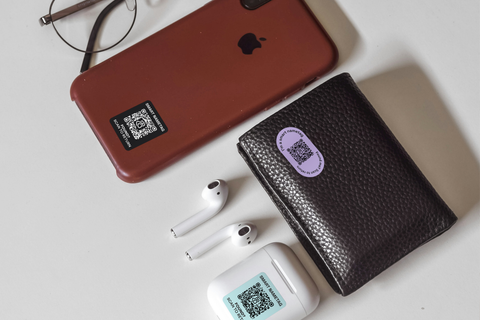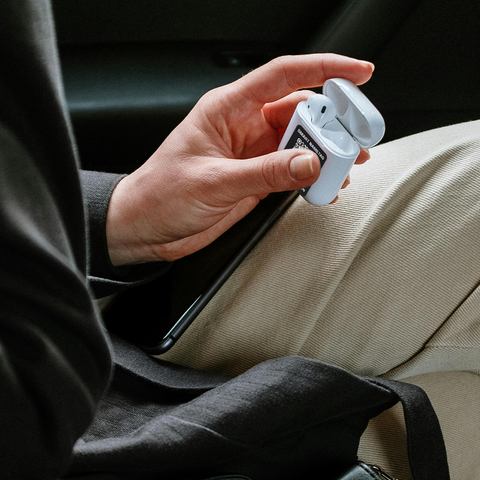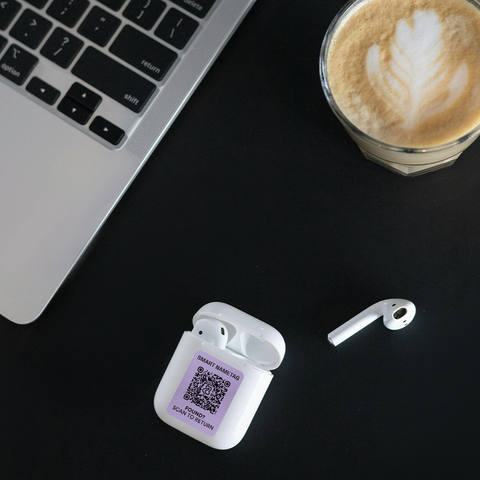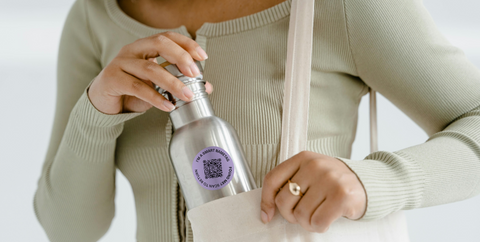The smarter, safer alternative to trackers and nametags.
If you lost your headphones, passport or laptop tomorrow, it could be £££ gone.
Yet trackers don't stick, have limited range, and need constant charging. Nametags can’t be updated, expose personal info and need relabelling between owners.
BoomerangTag® is a smarter alternative: a durable QR code that finders can scan to easily return your lost belongings without even sharing personal information.
We've all seen those "I've found" messages in group chats and viral social media posts. Research shows finders return things, make it as easy as possible for them.
You choose what a finder sees
Every item can show just the right amount of information you want
Your Own Lost and Found System.
Every day, valuable items are lost and never returned simply because there’s no easy way to connect finders with owners. Boomerang® solves this problem with a simple, smart, and safe solution.
We sit between trackers and nametags. Durable and go on anything, yet also enable anyone to return the item.
There's no need to share personal info, no bluetooth to drain batteries, and no tracking to worry about.
Set up is rapid, with subscription free plans and no apps to download. In no time anyone, anywhere can return your lost item.
Let customers speak for us
Finders, Returners.
Did you know, a lost wallet has a 60% chance of return by a kind stranger if there are contact details available. Of course much lower if no contact details available!
We've all seen those messages in group chats and viral social media posts. Make it easier for finders to return your lost items.
Boomerang set up is easy
Complete these steps and anyone, anywhere can return what you lose.
PLUS & FAMILY PLUS
From £1/month
Boomerang® case studies
Boomerang® has helped recover all kinds of items: AirPods left behind in hotels, belongings misplaced abroad, borrowed car keys, and even water bottles that were lost far longer than anyone hoped but still made their way back.
Why BoomerangTag®
The smarter, more sustainable way to find things.
| Features | Boomerang Tags | GPS Trackers | Name Tags |
|---|---|---|---|
| Goes on anything | ✔ | ✘ | ✔ | Doesn't track you | ✔ | ✘ | ✔ | Doesn't reveal your details instantly | ✔ | ✘ | ✘ |
| Anyone can return the item | ✔ | ✘ | ✘ |
| Can be easily modifed | ✔ | ✔ | ✘ |
| Washer & dishwasher safe | ✔ | ✘ | ✔ |
| No batteries / bluetooth | ✔ | ✘ | ✔ | No subscriptions | ✔ | ✘ | ✔ |
Find more, waste less.
Every QR code is unique - a pack of 24 has 24 different QR codes. This means you can apply them to 24 different items or split them between different Boomerang accounts. It also means you know exactly what item has been lost, or you can rehome the individual item.
The contact details and information they can see are totally controlled by you, importantly it can be nothing.
Leave no information and finders can send you a message through Boomerang® via a big orange "Found me" button. You're notified by email, WhatsApp and SMS. This means neither finders nor owners need to share any personal details in order to return items.
E.g. finder finds your water bottle at the gym, they can scan and leave a message to say: "your water bottle is at the gym reception". Great, you know how to get your item back and neither finder or you has shared personal information.
Bluetooth trackers are great if you like to spend £40 for something that runs out of battery after 6 months, needs to be connected to work and tracks you the whole time.
Nametags are great if the finder is guaranteed to know you, and you don't mind sharing personal information.
Smart nametags sit in the middle. Anyone can return the item to you, they aren't expensive like bluetooth trackers and also go on objects that bluetooth trackers can't. They also don't track you or reveal all your information to anyone.
All of the tags come with subscription free features.
PLUS and FAMILY PLUS allow users to get more from their tags in addition to the free features.
It's not guaranteed, nothing is in life. Smart nametags give a lost item a chance to return though. A study dropped wallets with contact details across 40 countries (355 cities, 17,000 wallets) and found wallets with money were returned over half (51%) of the time - almost double the expected rate. In the UK the return rate was even higher at 60%!
This is because finders are very rarely thieves. It's just hard for them as they rely on group chats and social media to find you.
You'd expect the return rate to be very low without any contact details to help finders return the wallets.
Watch when the BBC dropped 10 wallets around Belfast with contact details in, how many do you think were returned?
Simply your phone and an email address. No apps to download and take phone space, or unique scanners.
When we started, we quickly found the phone was the toughest common place for a tag. In and out of pockets all day, hot then cold, keys scratching them often. See the attached picture for what a tag will look like after almost 10 months on a phone. Still works great, and is lasting much better than the case!
All our products are built to be durable like this.

You can, but we actually recommend using a traditional collar. Here's why:
For dogs, you need to consider the UK Control of Dogs Order 1992: every dog while in a highway or in a place of public resort shall wear a collar with the name and address of the owner inscribed on the collar or on a plate or badge attached to it.
As we don't inscribe details, you need to have a tag that does regardless of using a BoomerangTag®.
For other animals, if you lose them then really data protection isn't a priority and so having a number to contact immediately is sensible.
For items, it is very different, and that is why we created BoomerangTag® for items.
We don’t use NFC tags (the tech behind contactless cards) because they just don’t work well for lost-and-found items. While it sounds handy to just tap instead of scanning, there are a few problems:
- They don’t work on metal, which rules out loads of everyday items.
- They can mess with e-passports and stop them working at e-gates.
- Not many people actually know how to use NFC, and we need every finder to understand the technology.
That’s why we stick with QR codes — they’re simple, universal, and work every time.
Every account comes with 30 days free of our family premium plan.






